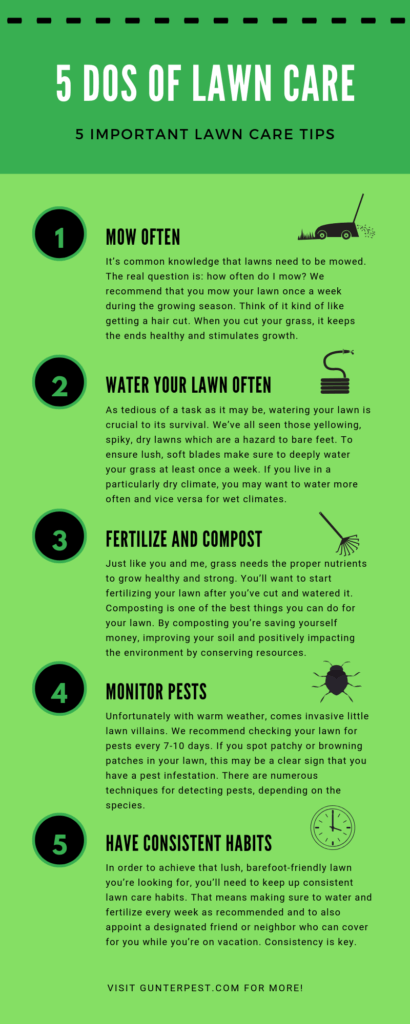Taking care of your lawn doesn’t have to be complicated. With a few basic lawn care practices, you can enjoy a lush, green yard that stands out in the neighborhood. In this guide, we’ll break down the essential steps for basic lawn care, helping you tackle weeds, patchy spots, and maintain that perfect green. Whether you’re a beginner or just looking to refresh your routine, these tips will set you on the path to a healthier, more beautiful lawn. Let’s dive in!
Check Your Lawn For Termite Mounds
A Short Video Synopsis Of This Blog Post For You To Share
Basic Lawn Care Do’s & Don’ts
 DO Mow Often
DO Mow Often
It’s common knowledge that lawns need to be mowed. It’s one of those time old chores that has been practiced throughout all generations. The real question is: how often do I mow? We recommend that you mow your lawn once a week during the growing season. Think of it kind of like getting a hair cut. When you cut your grass, it keeps the ends healthy and stimulates growth.
Important Note: Different grass species grow at different rates. You can learn more about the different grass species here.
 DON’T Cut Your Grass Too Short
DON’T Cut Your Grass Too Short
The ideal height for healthy grass is 3-3.5 inches. Before you mow your lawn, make sure that your grass is longer than the ideal height. If you cut your grass too short, you put their root system at risk. This prevents your lawn from soaking up the water and nutrients it needs to give you that healthy green look that everyone strives for.
 DO Water Your Lawn Often
DO Water Your Lawn Often
As tedious of a task as it may be, watering your lawn is crucial to its survival. We’ve all seen those yellowing, spiky, dry lawns which are a hazard to bare feet. To ensure lush, soft blades make sure to deeply water your grass at least once a week. If you live in a particularly dry climate, you may want to water more often and vice versa for wet climates. We recommend watering in the morning between 6 am-10 am. This gives your grass time to absorb all the moisture before the heat of the day kicks in. If you don’t want to deal with the hassle of it, you can always look into installing an irrigation system.
Important Note: Never cut wet grass. It can cause an uneven cut, root damage, the spreading of disease, and buildup in your lawnmower.
 DON’T Overwater
DON’T Overwater
When watering your lawn, it can be difficult to know when you’ve overdone it. The amount of water your lawn needs may differ depending on its species, but for a general rule of thumb, your lawn only needs 1 inch per week. It should only take about 10-15 minutes to deeply water your lawn to the recommended measurement. If you notice puddles forming or runoff, try watering at a slower, less intense rate. Different soil types absorb water at different rates. Overwatering can cause damage to the root system and make your lawn more prone to fungal growth.
 DO Fertilize and Compost
DO Fertilize and Compost
Just like you and me, grass needs the proper nutrients to grow healthy and strong. You’ll want to start fertilizing your lawn after you’ve cut and watered it. You can use a store-bought fertilizer and a spreader to ensure that the fertilizer is scattered evenly throughout your entire lawn. You also have the option to use mulched grass clippings for a more natural approach. If you use store-bought fertilizer, make sure that you don’t fertilize during extremely hot days to avoid burning your grass.
Composting is one of the best things you can do for your lawn. By composting you’re saving yourself money, improving your soil, and positively impacting the environment by conserving resources. It’s a win/win/win situation! Compost is filled with a variety of nutrients and microorganisms that your grass needs. Most synthetic fertilizers provide limited nutrients and can be mixed with harmful chemicals that are easily washed away into our rivers and streams. Here’s some more info on the basics of composting provided by the Natural Resource Defense Council (NRDC).
 DON’T Use Strong Chemicals & Pesticides
DON’T Use Strong Chemicals & Pesticides
We strongly recommend using natural fertilizers as opposed to synthetic. Untrusted brands of synthetic fertilizers can put your family, pets, and the environment at risk. Some of our favorite natural fertilizers include mulched grass clippings, manure (note: although effective, your neighbors may not like you for that one), bone meal, and compost.
Important Note: Don’t allow mulched grass clipping to build up more than 1/2 inch.
 DO Monitor Pests
DO Monitor Pests
Unfortunately with warm weather, comes invasive little lawn villains. We’re all too familiar with that frustrating moment when you’re doing everything right, yet your lawn still seems to be deteriorating. If that’s the case, then you’ve probably got yourself a pest problem. We recommend checking your lawn for pests every 7-10 days. If you spot patchy or browning patches in your lawn, this may be a clear sign that you have a pest infestation. There are numerous techniques for detecting pests, depending on the species. You can find more info here.
 DON’T Hesitate to Contact a Professional
DON’T Hesitate to Contact a Professional
Many people think that they can deal with the little intruders themselves. The problem is that many don’t know what exactly to look for and how to ensure that the pests are completely gone and stay gone. If you have the suspicion that your lawn has a pest infestation, don’t hesitate to contact a professional. They’ll be able to confirm what kind of infestation you have and offer services to help eradicate them.
We’d love to be your first choice! Here at Gunter, we’re dedicated to making sure you get the best and most effective pest control service.
 DO Have Consistent Habits
DO Have Consistent Habits
Whether you’re a lawn care expert or a first-time landowner. In order to achieve that lush, barefoot-friendly lawn you’re looking for, you’ll need to keep up consistent lawn care habits. That means making sure to water and fertilize every week as recommended and to also appoint a designated friend or neighbor who can cover for you while you’re on vacation. Consistency is key.
 DON’T Get Overwhelmed
DON’T Get Overwhelmed
All of these responsibilities may feel like a lot. Remember that you don’t have to dedicate every waking hour to your lawn. We simply recommend that you consistently water, provide nutrients, and check for pests. That’s it! Pretty simple right?
We Can Help!
We want taking care of your lawn to be enjoyable and stress-free. If it’s too overwhelming, our team is always happy to help alleviate as much stress for you as we possibly can. We offer an easy 7-step lawn care program that covers basic fertilization, pest control, and a variety of other special lawn care services. Don’t hesitate to reach out!
Share This Image On Your Site:
Be sure to check out our other services:
Termites — Lawn Care — Commercial — Spiders — Pest Control










